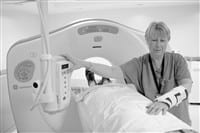Year-end Decisions It’s Crucial to Weigh the Tax Impact of Medical-equipment Purchases
The end of the taxable year is fast approaching for many area medical practices. As we head into the final stretch before Dec. 31, this becomes a critical time for year-end tax planning. While there are many avenues to pursue to accomplish this, one common approach is the consideration of whether or not to purchase that piece of medical equipment that you have been eyeing for months.
This decision is one that your practice may have been weighing for some time. As such, this article is intended to provide some final pieces of advice as you make this decision. This includes consideration of a final due-diligence review, the various tax implications as we move from 2012 into 2013, and some thoughts on whether leasing may be the right option for your practice.
Due Diligence
Just because it is the end of the year and you are trying to lower your taxable income does not mean that running out and spending $20,000 on an unnecessary machine is the right solution. Your practice has to do its homework.
First and foremost, is the equipment actually needed? Are you updating from an obsolete machine, or are you trying to spruce up the look around your office? Maybe you are considering adding a new service? Whatever the reason, this question must be answered ’yes’ before proceeding any further.
If it is determined that new equipment is necessary, a few other items should be analyzed. First, the right equipment should be identified. Since a capital investment is being made, you must be sure that the equipment will do everything expected. The second consideration is knowing and trusting your salesperson and the company that they represent. Too many times we have heard of a salesperson selling the world, but when it comes time to deliver, they are unable to do so.
The final consideration is determining whether or not the equipment will generate income for your practice. As the dollar value of the equipment increases, so too should the level of detail in the cost/benefit analysis being performed.
Tax Implications
As the purchase is made, there are various ways that it can be treated for tax purposes. The first is the use of standard tax depreciation (MACRS). This generally translates to a writeoff of the asset over three years (software), five years (medical equipment), or seven years (certain office fixtures). Effective for the 2012 tax year, Section 179 elections are available. This election allows the taxpayer to write off the full purchase price of new or used software and equipment. The amount allowable for 2012 is $139,000, with a limit of $560,000 in qualifying purchases. For 2013, barring any changes in the law, this is scheduled to be reduced to $25,000 with a limit of $200,000 in qualifying purchases.
In addition to Section 179, bonus depreciation is a third available option. Bonus depreciation allows the taxpayer to immediately expense 50{06cf2b9696b159f874511d23dbc893eb1ac83014175ed30550cfff22781411e5} of the cost of an asset and to depreciate the remaining balance over the asset’s depreciable life. This method can be used only on new assets and does not include software purchases. Additionally, it is important to note that bonus depreciation has not been extended into 2013.
In order to take advantage of Section 179 or bonus depreciation, the asset needs to be purchased and placed in service before the end of the year. An important difference between the two is that, while bonus depreciation can create a taxable loss, Section 179 cannot. Finally, each state has differing rules for how they treat the different types of federal depreciation methods, which must be discussed with your accountant. One example in our area is that the Commonwealth of Massachusetts does not recognize bonus depreciation.
Buy or Lease?
Based on the significant cash outflow, it may make sense from a business standpoint to lease the equipment versus buying it. Leasing can be advantageous in situations where technology becomes obsolete rapidly, where there are concerns over projected maintenance costs, and where cash may not be readily available for the initial investment. There are some potential drawbacks, however. The first and most significant is lack of ownership. By not owning the equipment, your practice will have less say in certain decisions down the road. This includes not being able to sell the asset for value when the lease expires. Another drawback is that leases tend to cost more over the long term.
The type of lease entered into can also impact the taxable income of the practice. Standard operating leases, such as those for a copy machine, are expensed as payments are made over the life of the lease. Capital leases (those meeting certain criteria, including a bargain purchase option) are recorded as an asset on your balance sheet and are depreciated similar to other assets. This could include the use of Section 179 or bonus deprecation, as discussed previously.
2013 and Beyond
As we head into a new year, it is important to consider the changing tax environment and how it may impact your decision to buy. Beyond the changes to Section 179 and bonus depreciation, tax rates across the board are expected to increase. As a result, some of our traditional tax-planning techniques may not hold true. In the past, accelerating expenses and deferring revenues were always top of mind; with increasing tax rates in 2013, it may be beneficial to do the opposite in 2012. In order to make this decision, it is important to consider what tax bracket you are projected to be in this year and going forward. For assets with a shorter life, such as software, it may make sense to defer your purchase until 2013.
Year-end and tax planning are upon us. With fog on the horizon, it is important to determine if the purchase of new equipment is the right approach for your practice. The decision is not as clear as in previous years, and is one that should be discussed with your tax advisor.
James T. Krupienski, CPA, is a senior manager with the Holyoke-based accounting firm Meyers Brothers Kalicka, P.C. His practice is based in the healthcare industry; (413) 322-3517; jkrupienski@mbkcpa.com



Comments are closed.